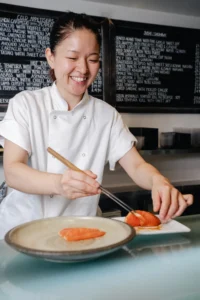Japanese Izakaya Culture and Social Life
Japanese izakaya culture shows how after-work gatherings extend office life into food, drinks, and meaningful social connection. After the day ends, colleagues naturally gather in bustling izakayas to share food, drinks, and conversation. Moreover, these after-work sessions, known as nomikai, play an important role in Japanese culture. In fact, they go far beyond drinking because they nurture group loyalty and restore essential social balance. As a result, they also provide a vital release from workplace stress.
The Japanese Izakaya Culture Experience
 Izakayas are informal pubs that blend cosy seating with an easygoing atmosphere. They serve everything from skewered yakitori to plates of sashimi. Drinks flow freely, ranging from beer to sake, and the mood is always relaxed. Unlike formal restaurants, izakayas encourage sharing, laughter, and spontaneous conversation.
Izakayas are informal pubs that blend cosy seating with an easygoing atmosphere. They serve everything from skewered yakitori to plates of sashimi. Drinks flow freely, ranging from beer to sake, and the mood is always relaxed. Unlike formal restaurants, izakayas encourage sharing, laughter, and spontaneous conversation.
Why Izakayas Matter
Izakayas matter because they create a space where hierarchy softens. At work, structure feels rigid. However, at the izakaya, barriers fall away. Managers sit beside new employees. Everyone enjoys the same food and shares the same drinks. This setting builds trust and keeps relationships strong.
Nomikai: The Social Glue
Nomikai, or drinking gatherings, are central to Japanese workplace life. These events strengthen unity among teams. Colleagues toast together, share small plates, and let conversations flow more openly than in the office.
Group Loyalty in Focus
Japanese work culture values the group over the individual. Nomikai reflect this mindset. Attending shows respect for colleagues and loyalty to the team. Even if someone does not drink, their presence signals commitment. Participation matters more than the alcohol itself.
Restoring Social Balance
Workplaces often carry stress, and therefore deadlines, pressure, and expectations weigh heavily on employees. However, nomikai evenings help reset this balance. During these gatherings, colleagues express frustrations in a safe space and laugh off mistakes together. As a result, they return to work with renewed energy. In this way, after-work socialising ultimately acts as an emotional reset button.
Stress Relief in Japanese Izakaya Culture
Drinking at izakayas is less about indulgence; instead, it is more about release. Therefore, people unwind naturally after long hours. Meanwhile, the casual atmosphere helps them smoothly switch roles, moving from employee to friend. With drinks in hand, conversations soon become light, and tensions gradually fade quickly.
The Role of Ritual
Nomikai often begin with a shared toast, or “kanpai.” This ritual sets the mood for the evening. Everyone drinks together, symbolising equality. It reminds participants that beyond job titles, they are all human. Such small rituals reinforce harmony within the group.
Balancing Tradition and Change
 Although nomikai remain popular, attitudes are slowly changing. Younger generations value personal time more. Some avoid late nights and prefer healthier lifestyles. However, izakayas continue to thrive because they adapt. Many now offer non-alcoholic drinks, lighter menus, and flexible hours.
Although nomikai remain popular, attitudes are slowly changing. Younger generations value personal time more. Some avoid late nights and prefer healthier lifestyles. However, izakayas continue to thrive because they adapt. Many now offer non-alcoholic drinks, lighter menus, and flexible hours.
Modern Adaptations
Companies also respond to shifting values. Some organise fewer gatherings, while others schedule earlier sessions. The idea of bonding over shared meals remains strong, even if traditions evolve. What stays constant is the cultural importance of togetherness after work.
The Cultural Significance of Japanese Izakaya Culture
Nomikai reveal much about Japanese society. They highlight the balance between duty and relaxation, structure and freedom. At work, respect for hierarchy guides interactions. At izakayas, social balance returns through laughter, shared food, and equality.
A Lesson Beyond Japan
Other cultures can learn from nomikai. While the form may differ, the value of informal social time remains universal. Shared meals or drinks strengthen teams, release stress, and improve workplace morale. In this way, izakayas offer insight into the wider role of socialising in human relationships.
Conclusion
Izakaya nights remain a cornerstone of Japanese work culture. Through nomikai, employees reaffirm group loyalty, restore balance, and release stress. These gatherings show how simple rituals, shared meals, and informal conversation can sustain harmony within demanding workplaces. As traditions adapt to modern life, the izakaya continues to provide more than food and drink. It offers a cultural bridge between duty and relaxation, hierarchy and friendship, making it one of Japan’s most enduring social institutions.



